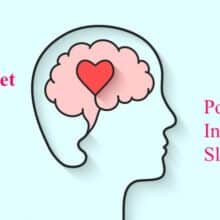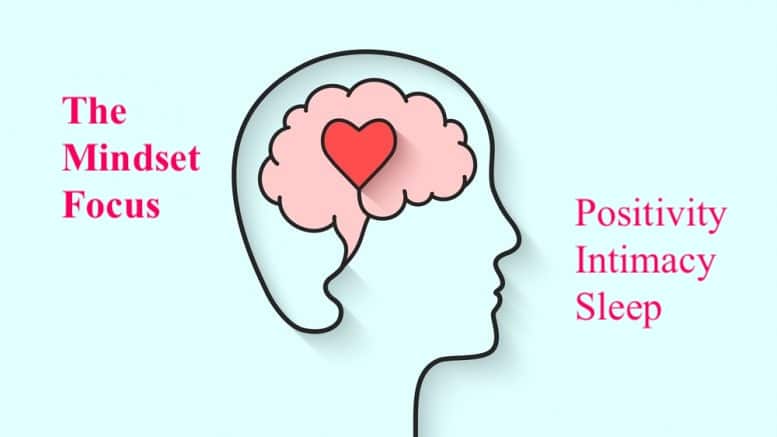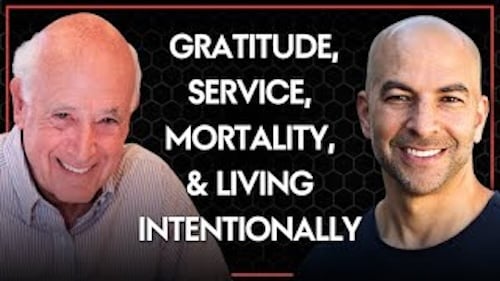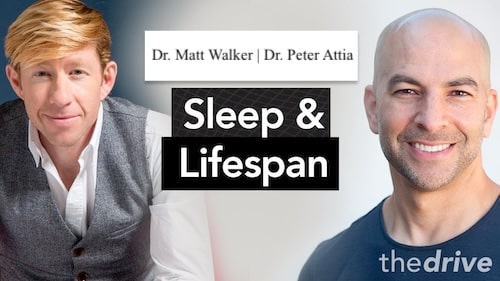The Mindset Focus: Positivity, Intimacy and Sleep

The mindset focus that is arguably the most important is on being positive, developing intimate relationships (not necessarily physical) and getting plenty of restorative sleep. Ignoring these will make it more difficult to bloom in your later years, and live the long and healthy life that is your potential.

The mindset focus that is worthy of your attention and practice is devoted to positivity, intimacy and sleep.
I wrote about this in Part 4 of my four-part series about prerequisites for longevity, and now I want to underscore what I had to say in that post with two video interviews conducted by Dr. Peter Attia, which he does in The Peter Attia Drive Podcast:
- Go here for the review of the mindset focus on positivity and intimacy
- Go here for the review of the mindset focus on sleep
Peter Attia, MD is considered among the most accomplished longevity experts in the world, largely due to insights gained from his clinical practice devoted to extending healthspan, and from his hundreds of interviews of people with expertise in every facet of health and longevity.
In the first video, Dr. Attia interviews Dr. Walter M. Bortz II, a Clinical Associate Professor of Medicine at Stanford University about the impact of gratitude, serving others, embracing mortality, and living intentionally.
In the second video, Dr. Attia interviews Dr. Matthew Walker, a Professor of Neuroscience and Psychology at the University of California, Berkeley, and Founder and Director of the Center for Human Sleep Science. They explore why we sleep, the stages of sleep, and sleep chronotypes, and he provides tips to those looking to improve their total sleep and sleep efficiency.
Before each video is displayed, I will write an intro and give you some background information, and then bullet point the main points. After the video, I will give you a rundown of what was said and timestamp each section.
Let’s dig in…
The Mindset Focus on Positivity and Intimacy

In the following interview, Drs. Attia and Bortz discuss the impact of gratitude, serving others, embracing mortality, and living intentionally. (Go straight to the video.)
In the depths of Walter’s journey lies a remarkable tale of dedication and purpose. Meet Walter M. Bortz II, a distinguished healer, author, and explorer of longevity. His path began at Williams College and then the University of Pennsylvania School of Medicine. As a Clinical Associate Professor of Medicine at Stanford University, Dr. Bortz’s contributions to geriatrics and healthy aging are nothing short of extraordinary. Through his compelling books, including We Live Too Short and Die Too Long and Dare to Be 100, he illuminates the secrets to a vibrant, fulfilling life.
Dr. Bortz’s message resonates far beyond medical journals and lecture halls. It’s a call to action, urging us to embrace life’s journey with vigor and purpose. He champions active living, advocating for the transformative power of exercise, nutrition, and meaningful connections. His words inspire us to seize each moment, cultivating gratitude and enriching the lives of those around us.
At the heart of Dr. Bortz’s philosophy lies a profound truth: life is not merely about the years we accumulate, but the impact we make. Through his own trials and triumphs, he imparts invaluable lessons on resilience and the enduring power of human connection. His journey, marked by personal growth and self-discovery, serves as a beacon of hope for all who seek to live with intention.
Dr. Bortz’s story isn’t just about him; it’s about us—about the potential within each of us to lead lives of purpose and significance. As we journey through life’s twists and turns, it would be wise to heed his wisdom, embracing gratitude, authenticity, and compassion along the way.
Main ideas about the positivity and intimacy mindset
- Dr. Bortz aims to express gratitude through a million gestures by his 85th birthday, emphasizing the importance of finishing life strongly.
- He reflects on a recent medical scare, prompting consideration of his ideal end-of-life scenario, prioritizing his wife’s comfort and security.
- He discusses efforts to tie up loose ends, including financial affairs and relationships, to ensure his wife’s well-being in case of his absence, highlighting the importance of addressing mortality and preparing for the future.
- Preparation for the end of life is crucial, with Dr. Bortz urging people not to delay addressing these matters, despite initial reluctance from others.
- Dr. Bortz emphasizes the value of expressing gratitude and giving back, sharing personal anecdotes to illustrate their impact.
- He discusses the influence of his actions on his children, stressing the importance of modeling behavior and fostering gratitude.
- Purpose and meaningful connections in life are significant, with Dr.Bortz citing personal experiences and urging people to prioritize caring for others.
- Dr. Bortz and Dr. Attia discuss the concept of purpose and peace in later life stages, emphasizing the impact on well-being and longevity.
- He shares stories of individuals embracing the “say it now” philosophy, highlighting the positive outcomes of expressing gratitude and reconnecting with loved ones.
- Practical advice and resources are offered for those interested in incorporating gratitude practices into their lives, emphasizing their transformative power.
Watch:
Here’s the rundown
00:00 Dr. Bortz’s Childhood and Family Struggles
- He reflects on his challenging childhood, including his family’s financial struggles and his mother’s battle with cancer.
- Moving frequently during childhood prevented him from forming lasting relationships, shaping his motivation and resilience.
- Losing his father at a young age and his mother’s illness instilled in him a sense of life’s unpredictability and the importance of living intentionally.
04:37 His Life Stages and Insights
- He divides his life into three stages: finding himself, making himself, and becoming himself, each lasting approximately 29 years.
- Despite facing numerous challenges, including financial hardships and personal losses, He maintains an intentional approach to life.
- His experiences underscore the value of resilience, self-reflection, and embracing life’s uncertainties.
10:06 Bortz’s Professional Journey
- After completing his education and facing personal struggles, he pursued various career paths, including public accounting, selling mutual funds, and multi-level marketing.
- Despite setbacks and financial losses, he continued to explore different industries and opportunities.
- His willingness to adapt and try new ventures eventually led him to the hotel industry, where he found success and stability.
22:21 Career transitions and entrepreneurial journey
- Transitioning between career fields and industries.
- Starting a new venture in the executive conference center industry.
- Overcoming challenges and becoming a successful entrepreneur.
24:12 Celebrating friendships and gratitude at 50th birthday
- Celebrating friendships through a special 50th birthday event.
- Publicly expressing gratitude and appreciation for friends.
- Creating memorable experiences and fostering connections.
32:23 Embracing mortality and intentional living
- Reflecting on mortality and the finite nature of life.
- Embracing gratitude and intentionality in daily living.
- Using intentional goal-setting and benchmarks to guide decisions.
43:45 Reflecting on impactful moments
- Reflecting on life-changing encounters with individuals facing mortality.
- Importance of intentional living and expressing gratitude.
- Commitment to personal growth and meaningful connections.
46:44 Deepening connections through intentional meetings
- Detailed process of meeting significant individuals and expressing gratitude.
- Systematic approach to meaningful conversations with purpose.
- Reflecting on the richness of relationships and personal growth.
50:39 Learning from intentional relationships
- Gratitude for the richness of relationships and experiences.
- Emphasizing the importance of acknowledging those who contribute to personal growth.
- Cultivating authenticity, empathy, and compassion in relationships.
01:06 Living intentionally and leaving a legacy
- Living a life of impact through gratitude and serving others.
- Legacy building through meaningful connections and expressions of appreciation.
01:13 Educating younger generations on gratitude
- Introducing gratitude practices in classrooms worldwide.
- Empowering youth to express gratitude and strengthen relationships.
01:18 Practical preparations for end-of-life
- Planning and organizing financial affairs for end-of-life scenarios.
- Encouraging timely expressions of gratitude and philanthropy.
01:25 Finding peace and fulfillment in the later years
- Cultivating gratitude and reflection for a fulfilling end-of-life experience.
- Embracing gratitude as a pathway to peace and fulfillment.
01:28 Finishing Strong
- Acceptance of life’s uncertainties and inevitabilities brings peace.
- Embracing the idea of leaving unfinished projects as part of life’s nature.
- Purpose beyond oneself, whether in work or caregiving, likely contributes to longevity.
01:30 Living with Purpose
- Having a sense of purpose beyond personal joy and pleasure may contribute to longevity.
- Finding fulfillment in purpose rather than pastime.
- Purpose can range from ambitious endeavors to simply caring for another person.
01:33 Acknowledgment and Gratitude
- Expressing gratitude towards others can deeply enrich both the giver and receiver.
- Relationships and acts of caring contribute to a fulfilling life.
- A focus on others brings energy and meaning to life.
That was quite a deep dive about tuning your mindset focus to positivity and intimacy. Now take a deep breath and jump into bed, sort of speak.
The Mindset Focus on Sleep

Sleep is the greatest life support system you could ever wish for. It’s a remarkable health insurance policy, it’s largely democratic, free and largely painless.
—Matt Walker
In the following video, Dr. Attia interviews sleep expert Dr. Matthew Walker. (Go straight to the video.)
Dr. Walker is a professor of neuroscience and psychology at the University of California, Berkeley, and a leading expert in sleep science, having published more than 100 scientific studies on sleep and its impact on health. He founded and directs the Center for Human Sleep Science at UC Berkeley, which uses advanced technology to study the relationship between sleep and various aspects of health.
In the interview, Dr. Walker gives an overview of why we sleep, the stages of sleep, and sleep chronotypes, and he provides tips to those looking to improve their total sleep and sleep efficiency. Additionally, he discusses the pros and cons of napping, and gives his current thinking on the effects of blue light and caffeine on sleep. Finally, he explains the dangers of sleeping pills and reveals what he believes are the most useful alternatives for someone struggling with sleep, such as those with insomnia.
It’s vitally important that you get enough restorative sleep. This can be challenging given the ceaseless activities ingrained in our modern society, but you must rise to the challenge because sleep is neither a luxury nor an indulgence — it is a biological imperative, deeply woven into the fabric of our evolutionary history. As we delve deeper into the complexities of human physiology, we begin to unravel the intricate tapestry of sleep’s vital role in our lives.
At its core, sleep serves as the cornerstone of our physical and mental health, providing the essential respite our bodies and minds require to function optimally. It is during sleep that our bodies engage in a symphony of physiological processes, from cellular repair and regeneration to hormonal regulation and immune function. Without adequate sleep, these crucial functions falter, leaving us vulnerable to a myriad of health risks and ailments.
Central to our understanding of sleep is the recognition of its distinct stages, each characterized by unique patterns of brain activity and physiological changes. From the restorative depths of non-REM sleep to the vivid landscapes of REM sleep, our slumber unfolds in a choreographed dance of neural rhythms and bodily rhythms.
Contrary to previous misconceptions, it is during the deepest stages of sleep that the true magic happens. Deep sleep, or slow-wave sleep, plays a pivotal role in the consolidation of memories, the processing of emotions, and the transfer of neural information. Far from being a state of unconsciousness, deep sleep is a time of profound neural activity, essential for maintaining cognitive function and emotional well-being.
Yet, sleep is not a one-size-fits-all proposition. Just as our bodies come in different shapes and sizes, so too do our sleep patterns. Chronotypes, or genetic predispositions to sleep at certain times of day, play a significant role in determining our sleep quality and efficiency. Understanding and honoring these individual differences is essential for optimizing our sleep schedules and maximizing our overall health and well-being.
In the quest for better sleep, efficiency is key. It’s not just about the number of hours spent in bed, but the quality of sleep achieved during those precious hours. Sleep efficiency, measured by the ratio of time spent asleep to time spent in bed, offers valuable insights into our sleep patterns and habits.
Fortunately, improving sleep quality is within reach for each of us. By embracing the principles of sleep hygiene—maintaining a consistent sleep schedule, creating a restful sleep environment, and practicing relaxation techniques before bedtime—we can pave the way for more restful nights and rejuvenated mornings.
The most crucial step on the journey to better sleep is setting manageable goals and committing to small, sustainable changes. Whether it’s establishing a nightly wind-down routine or incorporating mindfulness practices into our daily lives, every step we take brings us closer to the restorative embrace of sleep—and the boundless potential it holds for our health and well-being.
Main ideas about sleep and how to improve it
- Sleep is evolutionarily vital, with modern lifestyles often neglecting its importance, leading to health risks.
- Sleep serves as the foundation of overall health, supporting various physiological functions crucial for well-being.
- Understanding sleep stages, including non-REM and REM sleep, is essential for comprehending sleep physiology.
- Deep sleep plays a critical role in neural information transfer and brain function, contrary to previous misconceptions.
- Chronotypes, genetic sleep patterns, impact individuals’ sleep quality and should be considered for optimal scheduling.
- Sleep efficiency, considering both time spent in bed and actual sleep duration, is crucial for overall health.
- Implementing sleep hygiene practices, such as maintaining a consistent sleep schedule, can improve sleep quality.
- Setting manageable goals for improving sleep hygiene and implementing wind-down routines before bedtime are essential for better sleep.
Watch:
Here’s the rundown
02:12 Sleep’s Evolutionary Importance
- Sleep’s evolution took 3.6 million years to develop an eight-hour nightly requirement.
- Modern lifestyles have drastically reduced sleep time, posing risks akin to reducing oxygen saturation.
- Understanding the evolutionary significance highlights the critical role of sleep in human health.
07:32 Sleep’s Foundational Role
- Sleep is not just a third pillar but the foundational basis of health, supporting diet and exercise.
- Deprivation of sleep can quickly deteriorate health, surpassing the impacts of food or activity deprivation.
- Sleep serves vital functions crucial for overall well-being and disease prevention.
10:01 Understanding Sleep Stages
- Sleep stages consist of non-rapid eye movement (non-REM) and rapid eye movement (REM) sleep.
- Non-REM sleep progresses through four stages, with deep stages providing significant restoration.
- Brainwave patterns shift during sleep stages, indicating different levels of consciousness and physiological processes.
19:18 Understanding deep sleep physiology
- Deep sleep involves coordinated activity of hundreds of thousands of neurons firing together.
- Initially misunderstood as a state of inactivity, deep sleep facilitates information transfer within the brain.
- Deep sleep acts as a mechanism for long-distance information transfer akin to long wave radio.
25:46 Exploring sleep chronotypes
- Chronotypes, whether morning or evening, are under genetic control and can change with age.
- Genetic tests and pencil-and-paper methods like the MEQ test help determine one’s chronotype.
- Understanding chronotypes can lead to better scheduling and mitigate societal misunderstandings about sleep patterns.
36:34 Sleep opportunity versus sleep duration
- Sleep efficiency is crucial, with 90% efficiency being ideal for healthy adults.
- Sleep opportunities should consider both time in bed and actual sleep duration.
- Devices like the Oura ring can help individuals monitor and optimize their sleep efficiency.
38:23 Understanding sleep efficiency and insomnia treatment
- Understanding the distinction between total sleep time and efficiency.
- Insomnia treatment may involve extending sleep opportunities to improve total sleep time.
- Constraint of sleep opportunity can increase sleep efficiency, especially for individuals with insomnia.
41:35 Pros and cons of napping
- Naps can provide benefits for cognitive function and memory, even with short durations.
- Napping can reduce sleep pressure, affecting nighttime sleep quality negatively.
- The suitability of napping depends on an individual’s sleep quality and overall sleep pattern.
46:03 Historical sleep patterns and biphasic sleep
- Historical sleep patterns of hunter-gatherer tribes suggest biphasic sleep, with a daytime nap.
- The concept of biphasic sleep involves a shorter nighttime sleep duration and a daytime nap to compensate.
- Hunter-gatherer sleep patterns were influenced by environmental factors like temperature changes and cultural practices.
50:24 Sleep hygiene tips and wind-down routine
- Key sleep hygiene tips include maintaining a regular sleep schedule, optimizing bedroom conditions, and avoiding stimulants before bedtime.
- Establishing a wind-down routine before bedtime can help prepare the body for sleep.
- Removing clock faces from the bedroom and limiting exposure to electronic devices can improve sleep quality.
57:44 Sleep Hygiene and Manageable Goals
- Setting manageable goals for improving sleep hygiene is crucial.
59:37 Impact of Temperature on Sleep Quality
- Our ancestors’ sleep patterns in different climates suggest a preference for cooler temperatures for better sleep.
- Temperature variations influence sleep duration and quality, with cooler temperatures correlating with longer sleep.
- Strategies such as warming extremities before bed and then cooling down during sleep can enhance sleep quality.
01:08 Effects of Blue Light and Device Use Before Bed
- Blue light’s role in disrupting sleep may be less significant than the overall stimulating effect of electronic devices.
- Devices’ stimulating nature can override natural sleepiness cues, affecting sleep quality.
01:15 Impact of Caffeine Consumption
- Moderate caffeine consumption has shown associations with reduced risk of certain diseases.
- However, excessive caffeine intake, typically beyond three or four cups, may have adverse effects on health.
01:16 Caffeine consumption and its impact on health
- Caffeine consumption has associations with both health benefits and detriments.
- The timing and dosage of caffeine intake play crucial roles in its effects on health.
- Antioxidants present in coffee may contribute to its health benefits, potentially overshadowing the effects of caffeine itself.
01:19 Risks associated with sleep medications
- Traditional sleep medications like Ambien and Lunesta pose significant health risks, including mortality.
- Prescription sleep aids should be approached with caution and considered as a last resort.
- Cognitive-behavioral therapy for insomnia (CBTI) is recommended as a safer alternative to sleeping pills.
01:23 Cognitive-behavioral therapy for insomnia (CBTI)
- CBTI is a non-pharmacological approach to treating insomnia, focusing on psychological methods.
- Tailored solutions are developed for individuals based on their specific sleep problems.
- CBTI can be as efficacious as sleeping pills in the short term and offers long-term benefits with proper adherence.
01:29 Evaluation of sleep medications and alternatives
- Evaluation of sleep medication effectiveness should consider individual response and outcomes.
- Benzodiazepines and over-the-counter sleep aids like Benadryl may have significant risks and limited benefits.
- Xyrem (GHB) can increase slow-wave sleep but may negatively impact sleep spindles critical for memory and brain plasticity.
If you found anything of value from this post, please share it with others.
Last Updated on March 9, 2024 by Joe Garma


